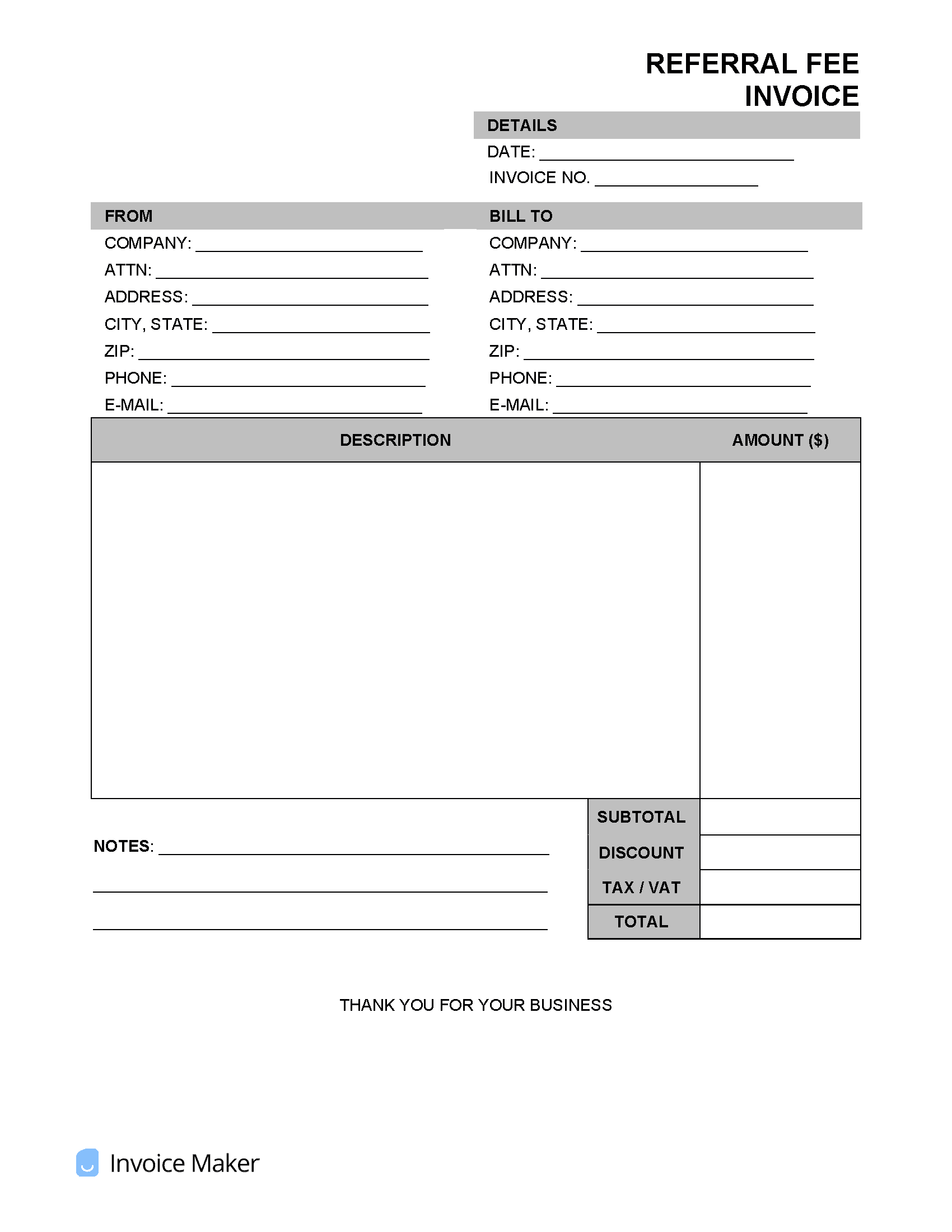Referral Fee Invoice Template
The referral fee invoice is a payment made to an affiliate that assisted in generating a sale or a lead. A referral may be used in most businesses, although the most popular is in the real estate community among brokers and agents. For example, if a real estate agent has a client moving to another part of the state, the real estate agent will “refer” them to another agent in that market area. Once the referred agent finds the client a new home, they will commonly send a referral fee of 20% to 25% of the total commission.
Paying Referral Fees
Referral fees are a way of getting paid by sending traffic (customers) to a sale. The most important thing for a website is its traffic. Without traffic, there can be no sale. Most websites will reward a person if a product is sold due to the traffic brought by that person. With analytics and affiliate software, websites can track sales from referral traffic and pay the referral/affiliate fee.
Real Estate
To receive a referral fee on a real estate transaction, the person collecting the referral fee must have a valid real estate license issued by their state’s real estate commission. Real estate agents are not allowed to sell real estate out-of-state but are allowed to collect a referral fee on a property that’s not in their licensed state. Since this type of transaction often occurs, there are industry standards to abide by. A referral payment must be made by an agent’s brokerage directly to the referral agent’s brokerage. For example, a licensed real estate agent named Bob knows a homeowner who wants to sell their home but doesn’t know how. The homeowner asks Bob for advice, but Bob only specializes in commercial real estate and no longer sells homes. However, Bob’s old colleague, Jim, is still a residential real estate broker that could help. Upon hearing the offer, Jim agrees to pay Bob a 25% referral fee for the listing. Jim then lists the house for $250,000 at a commission fee of 6%. Once sold, Bob is due a referral fee from Jim. The brokerage that Jim works for needs to send a referral payment of $3,750 to the brokerage that Bob works for. Bob’s brokerage then needs to pay Bob his referral fee.
Real Estate Visual Example
Listing Price of Home: $250,000 Listing Agent’s Commission Percentage: 6% (6% of $250,000 = $15,000) Bob’s Referral Fee Percentage: 25% of Jim’s 6% Commission (25% of $15,000 = $3,750)
Amazon
Amazon works in the opposite of how the traditional referral process works. With Amazon, its platform provides all the traffic. From their computer or smartphone, a user can go directly to Amazon (direct traffic) to find products from sellers all over the world. Because Amazon provides the traffic, they on average charge a 15% referral fee when a seller decides to sell a product on their marketplace. All items are categorized, and the referral fee is based on the category they fall into. Let’s say a seller lists a cell phone for $500 in the hopes of finding a buyer. According to Amazon’s Referral Fee Schedule, Amazon would collect an 8% referral fee on the sale of the cell phone.
Amazon Visual Example
Phone Price: $500 Referral Fee: 8% (8% of $500 dollars = $40) Net Profit to Seller: $460
Referral Fee Agreement
A referral fee agreement is most known for being used between real estate brokers when referring potential clients to each other. However, a referral fee agreement can be used anytime one party gives or refers a lead to another party. In real estate, brokers will refer buyers and sellers to other agents/brokers for many reasons, and in return, they expect to be paid a referral fee if the property is bought or sold from the referred client. A 25% referral fee is standard in the real estate world, but of course, that number is negotiable.
